Last Updated on November 6, 2024 by Michelle
Since our barn cats are an essential part of our homestead, I’m often sharing about them on instagram. Which means folks are often asking me questions about them. So today I’m sharing my answers to your most asked Barn Cat Questions….
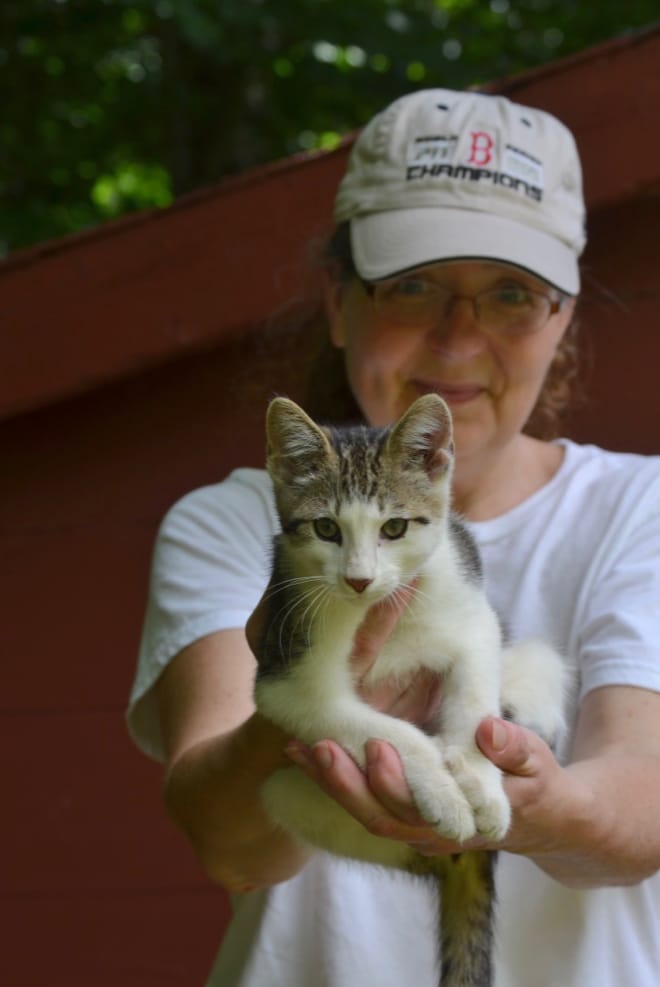
Barn Cat Q & A
How do you convince a dog-person spouse to get barn cats?
Point out that cats are working animals on the farm.
I can testify to this, because I am 100% a dog person. But after loosing countless amounts of rabbit, duck, and chicken food to thieving mice, I started to be swayed that a cat might be a good addition to the farm. After two long winters of hearing rodents playing in our walls and ceilings of our 200-year-old farmhouse I’d had enough of that too. Barn cats will rid your home of rodents in the walls in the winter–our main culprits were flying squirrels and field mice–but they’ll also make a huge difference all spring and summer with problems with moles, voles, squirrels, and (our biggest problem here, in New England) chipmunks destroying fields and eating the animals’ food.
Are barn cats ever allowed in the house?
This is, of course, totally your decision. We limit the time, but it definitely happens.
Our cats will sit at door and wait till they’re allowed in. But we rarely let them in. When we do, it’s usually just for a few minutes. Of course they are sneaky and super smart and will find ways to get in on their own accord. More than once I have walked into the living room to find Mr. Bingley sprawled out on the couch like it’s his domain.

Does the dog get along with the barn cats?
With just a few simple efforts on your part, your dogs and cats will respect each other. Maybe even eventually be friends.
Training our two dogs to behave with our free-ranging chicken was much harder than making them behave with the cats. In fact, the cats do all the training themselves, with severe hisses and arched backs that warn the dog they are not to be messed with. Even tiny kittens that are just a month old will do this and actually scare the dogs. It’s the funniest thing to witness.
Of course we can help the process along as well. Simply introduce the dog to the kittens the right way. Make sure dog understands the cat is something we care about and value, then most dogs will respect it.

Do the barn cats bother the chickens?
With just a few simple efforts on your part, your cats will respect your chickens.
I found that training the dogs to be chicken friendly was much more complicated than training the cats. (Read how I trained the dogs to respect the chickens right here.)
When kittens are about 5-6 weeks old they start to roam and venture a little bit outside of the barn and a few feet away from momma. When their wobbly legs venture near the free-ranging chicken, we immediately show them how to respect chicken. We will toss them away and use firm voice if they act like they may pounce on a chicken.
They do sometimes eat food scraps that we put out for the chickens. When we catch them, we just shoo them away and surprisingly they seem to respect that that food isn’t theirs. Of course they’d much rather have a live mouse over food scraps any day.

Do you feed your barn cats?
This answer will vary from farm to farm, but you should expect to provide cat food at least during the coldest times of the year.
With kittens, when mom is weaning them around 3-4 weeks old, we do always have food out. And during the cold winter months, we always make sure a dish in the barn has some food in it for the cats, in case they’re having trouble finding rodent meals.
In general, to make sure they do their job, we give them very little food. we have so many varmints–and they LOVE hunting. We know they’re not too hungry when they leave prey uneaten on the doorstep.
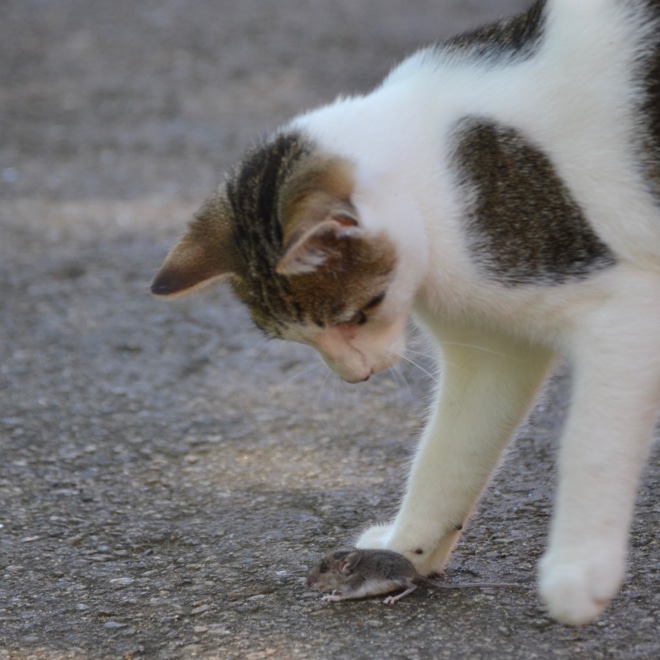
How do you teach barn cats to go outside and not pee in the barn?
Cats are innately smart animals and innately clean animals, they know to go outside automatically.
If you make litter available in the barn for the kittens, they will never make a mess in the barn.
And they know real dirt is much better than litter. As soon as they are big enough to venture outside, they stop using the litter. We keep a litter box right by the barn door when we have kittens in the barn. Soon enough they stop weaning off of using litter and go outside.
Is it really okay to leave barn cats outside in the barn in a harsh winter?
We’ve found that our cats prefer to be outside. They like the freedom it offers them and they’re good at staying warm on their own.
Barn cats are intuitively outdoor smart. We’ve found that they thrive in all environments. Plus, the barn isn’t too cold even when the temps dip outside. We find that the barn cats thrive in the winter as well as the summer.
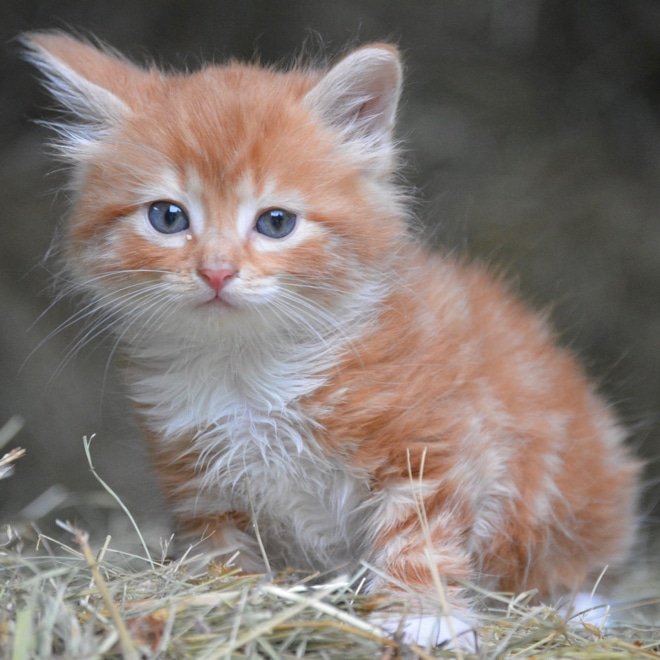
Do you name your barn cats?
We always name our barn cats.
We pride ourselves on raising friendly barn cats who don’t mind sharing their barn with people. And because their comical antics always give us so much to talk about, we have to know who we’re talking about. We tend to love literary names, so we’ve had Lassie, Reepicheap, Mr. Bingley (pictured above, as a kitten), and E.B. (pictured below, as a kitten, our almost black cat, named in every sense of irony after E.B. White, since he authored Stuart Little, and since E.B. is always on the hunt for Stuart for breakfast.)
Lassie–named after Laissez-faire, because when she is left to her own devices, she finds all the food she needs. On her own.
Then there’s Reepicheep, named after our favorite literary mouse, in honor of the many scurrying rodents who have been read their last rights in her churning, bursting belly.
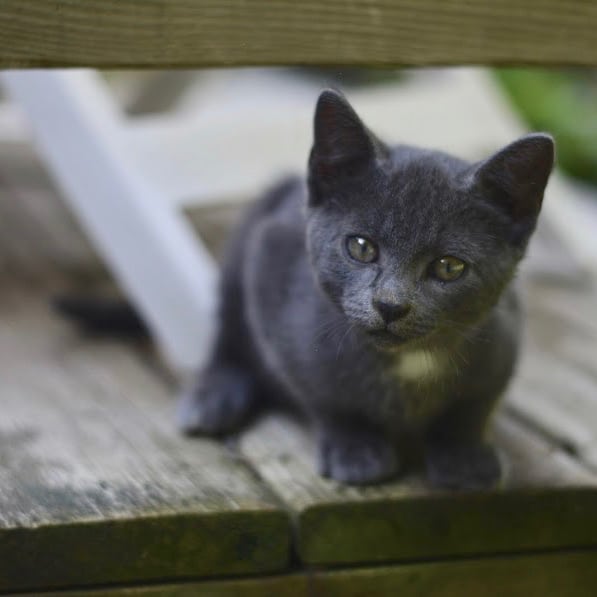
What’s more valuable a barn cat or a homestead dog?
Both.
It’s never been a secret around here that I am not a cat person. I am a dog person, through and through. I would never want to have a homestead without a great dog or two. Bixby is a companion, always by my side. (Find out Bixby’s favorite things right here.) It’s important to me to have a 75lb dog keeping me safe, alerting me that there may be a coyote or bear lurking in the woods. He’s nice company when I do my farm chores, especially if I have to venture around in the dark.
But the biggest bonus to a homestead dog? They are wonderful at marking their territory. They keep our homestead boundaries marked and I sincerely believe that has kept our chicken attacks (by bobcats, foxes, coyotes, and the dreaded fisher cats) to a minimum.
But cats definitely pull their weight around here. They help save the chicken and duck food from being devoured by squirrels and chipmunks. They also save my sanity by killing varmints in the walls of this old farmhouse and keeping the moles and voles from taking over our fields.

What do barn cats need?
Barn cats are independent by nature and require the least attention of any farm critter around here, but we do provide a few important things for them…
Basically, the need a water dish (we love this one; it will last for a decade), soft bedding (or old blankets and pillows), food occationally in winter (we like this one), occasional toys are fun, but that’s really more for our entertainment. They entertain themselves.
Talk to me!
If you have any questions, leave a comment below. And please tag me on ig to introduce me to your barn cat or other farm critters @souly.rested.
Other Articles You’ll Enjoy:
Raising Barn Kittens… 5 Things You Need to Know
What are the best options for cat food?
8 Things Wanna Be Homesteaders Need to Know
What to do when a farm animal gets skunked
Dog Training & Other Fun Homestead Dog Stuff
A righteous person has regard for the life of his animal. Proverbs 12:10
Pin this for later!
Click on the image below to pin this post.
Find out why SoulyRested was considered to be one of the Top 20 Must-Read Homesteading Blogs of 2018 and then one of the Top Homesteading Blogs of 2019 as well.
I’d love to connect!
To find me in some other neck of the woods, just click any (or every!) icon below:



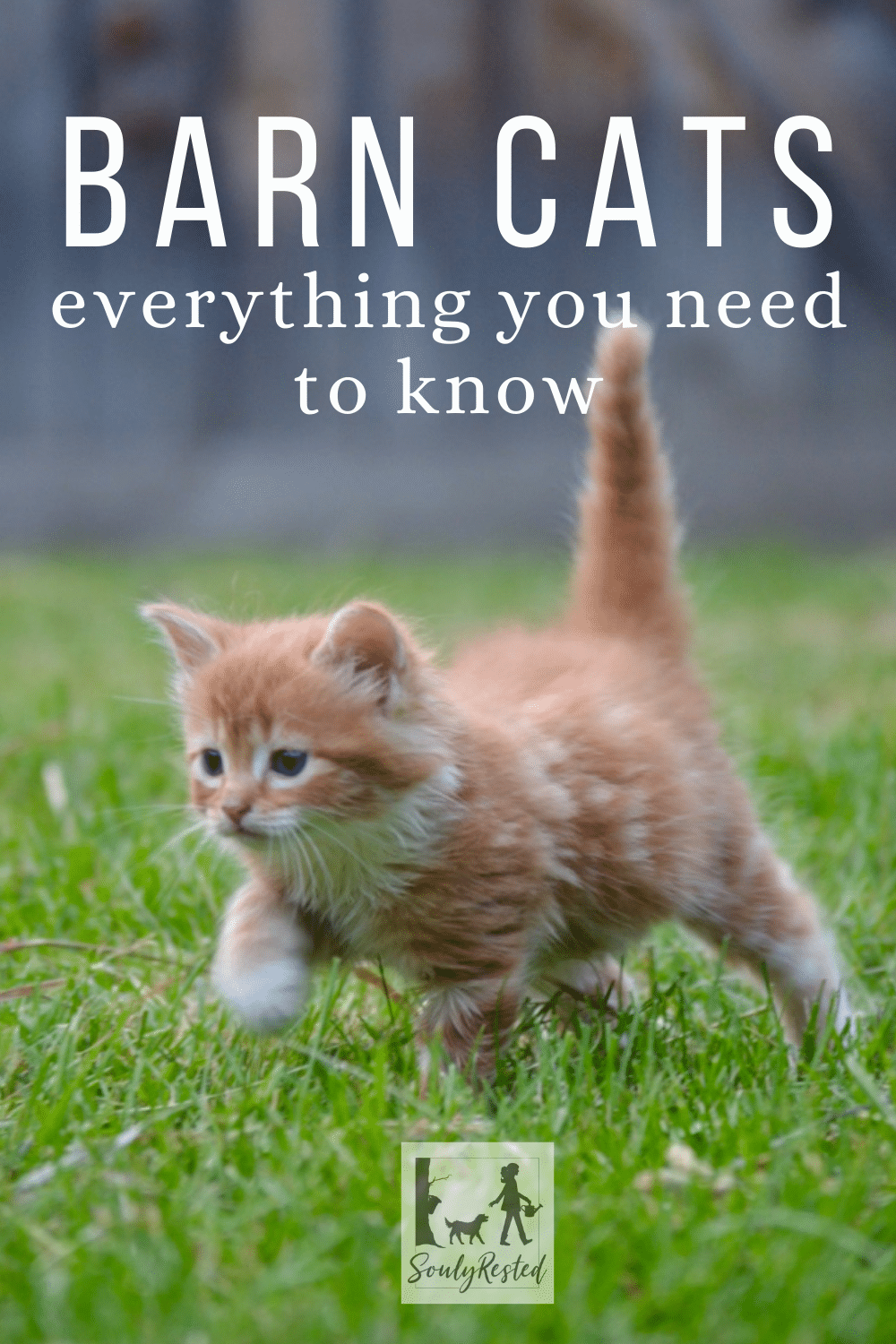





Can barn cats live and be safe with ground hogs, fox, and possums that live in the barn or at least wander in and around the barn?
Our cats have the barn to themselves (well, except for the mice that become meals) but they fend for themselves when they roam our 14 wooded acres and beyond, so they “meet up” with all of the above here on our homestead and do just fine.
Hello, does it get to hot in the summers in the barn for the cats/kittens?
Nope, that’s never been an issue. They find the coolest spots or lay in the shade in the tall grass. Of course here in New England we typically have amazing summers, not often too hot or humid.
Do the cats get locked up in the barn at night for their protection, or do they roam free? It seems most rodents on my homestead are active at night, so I’m not sure how much the cats will help if they’re only out during the day.
Our barn cats have free reign, to come and go as they please, all day and night.
All the barn cats I’ve ever seen were so wild you could never get near them.
They also actively hunted song birds. They were very prolific and had to cull them occasionally.
That’s sad. We’ve had many wonderful, very friendly barn cats. You do have to make an effort to make sure they’re around people and socialized as young kittens